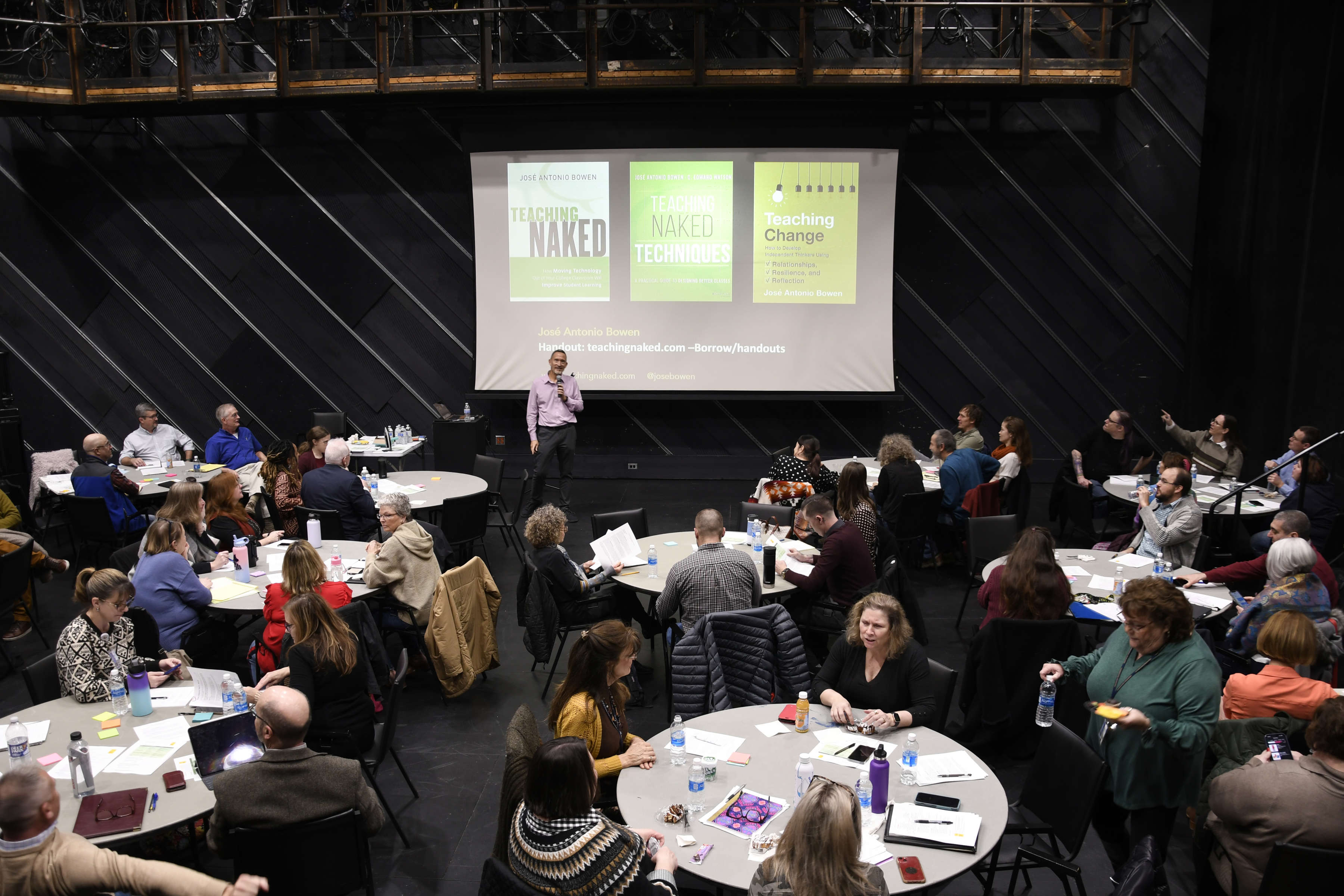ISSUED: 18 January 2023
MEDIA CONTACT: Dana Costa
SHEPHERDSTOWN, WV — Before students set foot in classrooms at Shepherd University on January 9, their professors were busy preparing for the semester. About 70 faculty and staff attended a workshop conducted by José Antonio Bowen titled “Teaching Change” to help them design better assignments, make learning more active, and create experiences that build community, motivate students, and help them succeed.
Dr. Stephen Spencer, provost and vice president for academic affairs, said because Shepherd welcomed the largest group of new students since 2018 during the fall 2022 semester and is on track to exceed that number next fall, the University hosted the workshop with Bowen, so faculty and staff are prepared to work with students who have had to deal with many issues over the past three years.
“Our students have been living through a pandemic, navigating the challenges of technology and social media, and worrying about the economy, climate change, and profound cultural shifts. We need to understand our students and how their emotional well-being impacts learning, retention, and student success,” Spencer said.
“Bowen’s work draws on wide-ranging research from biology, economics, psychology, education, and neuroscience,” Spencer said. “It challenges us to reflect on our job in higher education, which is to help our students become independent thinkers prepared for the future.”

During the workshop, Bowen focused on ways instructors can design class assignments and activities and use technology so that material is available and understandable to a wide number of students. Because students are so digitally connected, technology can be harnessed to connect with them to encourage better learning and more success. Bowen said professors should think of themselves as cognitive coaches who are helping the students do the work.
“There are concrete things professors can do to make their assignments clearer and better,” Bowen said. “But it’s also a mindset that learning involves emotions and caring and thinking that a student matters. The job of a teacher is to know content and design the delivery, while also recognizing that motivating students to do the work is part of the job.”
The way humans learn has not changed much, according to Bowen, but the current generation grew up after 9/11, so their threat response is different. Also, he pointed out that COVID-19 has radically changed a generation because they had less social exposure in high school at exactly the time that they most needed it.
“Evidence shows they are less comfortable in groups and more comfortable communicating by text,” Bowen said. “Their behaviors are different. Their psychology is different. They have different references. They know different TV shows and music. Since we mostly teach through analogy, we have to be cognizant that our message may not be getting across. Understanding that students are starting in a different place is critical to what we do as teachers.”
The takeaway
Dr. James Broomall, associate professor of history and director of the George Tyler Moore Center for the Study of the Civil War, was among the faculty who attended the workshop.
“I think this generation that has gone through the COVID-19 pandemic requires new strategies for teaching and learning and I thought Professor Bowen would offer some insights in that regard,” Broomall said. “There are a number of small tweaks he mentioned that would be instrumental in changing the nature of how I do things. Most of my students are non-majors, so I’m always trying to find a way to meet them at their level.”
Monica Larson, professor of communication, and Dr. Heidi Dobish, associate professor of psychology, both attended the workshop because they wanted to find new ways to connect with their students.
“I like having the time to just focus on things that may seem obvious once you’ve been told them,” Larson said. “It’s good to have that luxury of time before the semester starts to think about how the ideas being conveyed here would apply to my own teaching.”
“I love opportunities to be creative and think outside the box,” Dobish said. “I usually go to the internet to see what’s out there, but it’s nice to learn what he’s (Bowen) done and to see his way of engaging students.”
Dr. Laura Robertson, associate professor of biology, was particularly interested in what Bowen said about the reluctance of some students to participate in classes.
“I have gained some new tools for working with and connecting with students who are nervous and shy in classes,” Robertson said. “I teach in a really interactive way, and I ask students questions and expect them to answer. Some of these tools we’re learning in this workshop offer useful ways to get students who wouldn’t feel comfortable interacting out loud and in person to respond and interact.”
Provost Stephen Spencer said he hopes attending the workshop will inspire Shepherd’s professors to be creative in how they motivate students.
“Building a welcoming and supportive community for our students is more important than ever and necessary to help them grow, learn, and succeed,” Spencer said. “We want to design an education at Shepherd that helps students increase effort and motivation, provides more and better feedback, helps students learn on their own, and helps them integrate new information now and after they graduate.”
Listen to José Bowen, Dr. James Broomall, Dr. Heidi Dobish, and Dr. Laura Robertson here.
— 30 —
